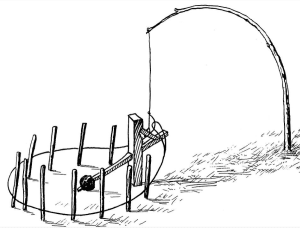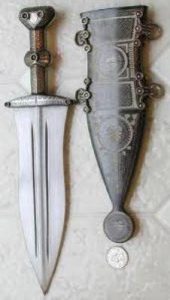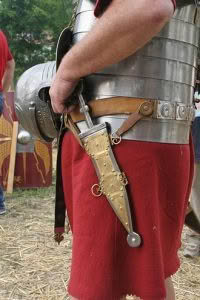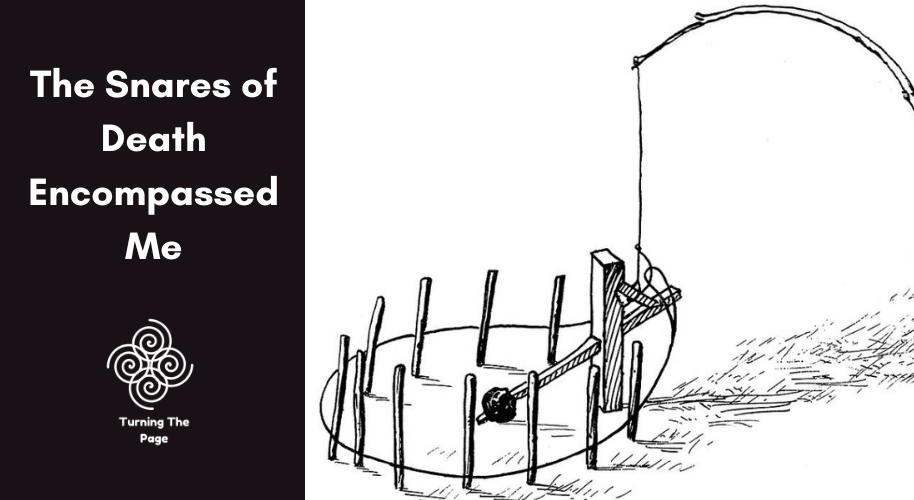Being caught in a trap was felt by the poet who wrote ‘The Snares of Death Encompassed Me’, but they had a way out.
I was recently watching one of those ‘survival’ reality T.V. shows where people are thrown into the wilderness and they have to survive.
The show was called ‘Alone’ and was in Tasmania, Australia.
To survive, they had to catch their own food and build their own shelter, etc.
One contestant decided to try to catch a Pademelon which is like a tiny kangaroo.
So he made a snare trap 
A snare trap is basically a rope noose that, when an animal passes through, it triggers the rope to tighten quickly around the animal and it is caught and can’t escape.
The hunter can then come and kill the animal.
But imagine the sense of being trapped by a rope. A rope that has grabbed you and you can’t get free. The more you struggle, the tighter it gets.
It might even be a net, and you are knotted into the mesh of the net.
Your heart is thumping. You’ve lost control and freedom.
Enter a poet who has been in that place.
The snares of death encompassed me
The poet writes out from the emotional experiences they have had. Words take you into their world.
In Psalm 116:3, we find this panicked place.
The snares of death encompassed me;
the pangs of Sheol laid hold on me;
I suffered distress and anguish. Psalm 116:3.
That’s what deep suicidality can feel like.
Being entangled in a mesh of death. You’re tangled up in so much rope that hopelessness and despair takes over.
The brain loses any will to live. The entanglement becomes so tight and mesh like thick that no light can penetrate the weave.
Our poet is full of anguish and terror and writes ‘the pangs of Sheol laid hold on me’.
A ‘pang’ is a sudden sharp pain or painful emotion. Sheol, in the Hebrew, is the state or abode of the dead.
It’s the fear, terror, shock of facing death.
You’re trapped and you’re going down further and further into a deep, dark hole.
The snare and entrapment moulds your way of thinking. The brain changes and you automatically look for anything to confirm your entrapment.
This trap can become a home. You learn to accept the entrapment. Ways of coping begin to shape your brain and your whole life.
Have you been there? Are you there now?
Then I prayed
Out of this state of alarm, panic and fear, the poet prays.
Then I called on the name of the Lord:
“O Lord, I pray, deliver my soul!” Psalm 116:4
The poet shifts the brain’s focus away from the entrapment to a focus on God.
We don’t know exactly how God took the poet out of the snare, but we can read more of the Psalm.
The next few lines say this.
Gracious is the Lord, and righteous;
our God is merciful.
The Lord protects the simple;
when I was brought low, he saved me.
Return, O my soul, to your rest,
for the Lord has dealt bountifully with you. Psalm 116:5-7
In this place of panic the poet reminds themself of truth.
- The Lord is gracious
- The Lord is righteous
- God is mercy – not giving us what we deserve
- The Lord protects the simple
- The Lord saves those who are brought low
- There is a place for the soul to rest, the opposite of the ‘pangs of Sheol’
- God deals with us with a sense of grace – getting what we don’t deserve based upon our own merits
These all seem like brief insights and truths that could e used as short sharp prayers when I am caught in a trap.
I need a Pugio
I need something to cut my way out of the trap.  Something to slice through the snare.
Something to slice through the snare.
A knife small enough to cut the ropes holding me tight. Something close to me I can quickly lay hold on and whip out any time I feel a snare tighten around my freedom.
The writer of Hebrews describes such a weapon.
The word of God is living and active, sharper than any two-edged sword, piercing until it divides soul from spirit, joints from marrow; it is able to judge the thoughts and intentions of the heart. Hebrews 4:12
I was talking with master artisan and pastor Patrick Pointer about what sort of two-edged sword the writer would have been referring to.
He told me it would have been a Pugio, a small dagger held as a side-arm.
I can easily imagine a Roman soldier if caught in a net reaching for this sharp two-edged dagger to slice his way out.
A sharp little knife
Some simple words to say
A quick thrust of the dagger
Into the net and ropes
That want to make me stagger
Give me the words
Tell me the truth
Give me the knife
To cut right through
I pick up the knife
Crafted in a forge
Truth that God has given
Hope within is stored
I sharpen this knife
I keep it close
For to whip it out
At a moment’s notice
There will always be snares
There will always be traps
Ropes that have been laid out
The purpose of throwing me in the crap
But I will trust
In a sharp little knife
Given to me by you
To cut through the strife
Point out the traps
Camouflaged false lies
Keep my senses aware
For what the evil one does try
Sharpen my knife Lord
Keep reminding me of truth
Keep me walking this valley
Flooded presence of you
Barry Pearman
Have you got a sharp little knife?
My sharp little knife happens to be what I call a thinking compass.
It’s a small book that I write notes, insights, verses, prayers that I whip out and read when I feel the entanglement of a snare.
I add to it regularly.
Questions?
Comments?
Email me 🙂📨
barry@turningthepage.co.nz
Give a little gift to keep the pages turning
Quotes to consider
- Be assured, if you walk with Him and look to Him, and expect help from Him, He will never fail you.
- The greater the difficulty to be overcome, the more will it be seen to the glory of God how much can be done by prayer and faith.
- One can no more pray too much than one can love too much; Victor Hugo Les Misérables
- We develop more grit through having repeated experiences of determination, endurance, resolve, perseverance, and sheer survival that get woven into the fabric of the brain – and thus one’s life. And we can turbocharge this process by how we engage our experiences at the time. Rick Hanson
- One speaks to one’s self, talks to one’s self, exclaims to one’s self without breaking the external silence; Victor Hugo Les Misérables
Questions to answer
- Have you experienced a ‘Snares of death’ moment? What helped you cut your way out?
- What are the ‘Snares of death’ that may look very inviting in the first instance, but upon closer observation bring about ‘pangs’ of anxiety and death?
- What little phrases, verses, insights do you carry close to yourself that can act like a little ‘pugio’ dagger?
Formation exercise
- Read through Psalm 116. Meditate on the passage and note down all the little affirmations and insights the Psalmist writes about. Pray they may become living and active, sharper than any two-edged ‘Pugio’.
Further reading
Barry Pearman
Photo by Pearson Scott Foresman Archives





